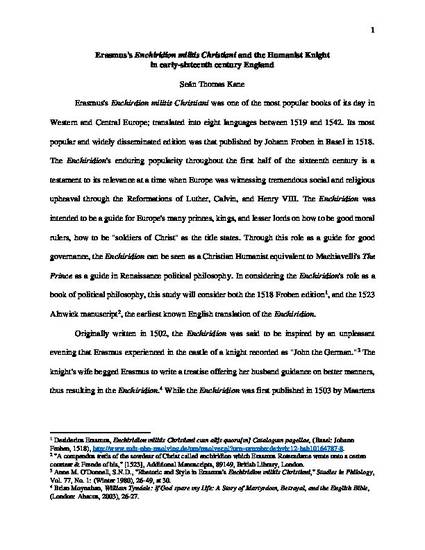
Unpublished Paper
Erasmus's Enchiridion militis Christiani and the Humanist Knight in early-sixteenth century England
(2019)
Abstract
Desiderius Erasmus of Rotterdam’s (1466-1536) Enchiridion militis Christiani is widely considered to be one of his greatest works after the The Praise of Folly, and Adagia. The Enchiridion was first written in 1502 as a handbook on how to be a good Christian knight. In this paper I intend to discuss how the Enchiridion reflected upon the English nobility and gentry at the court of the young king Henry VIII of England (r. 1509-1547), and whether or not they in turn responded or reformed their manners to fit the humanist model proposed by Erasmus in the Enchiridion. This paper uses a recently rediscovered English manuscript translation of the Enchiridion which is dated to 1523 and currently housed in the British Library (Additional MS 89149) as its main primary source. In using a contemporary translation to the period in question, I hope to observe how the verbiage of the translator reflects the English views of Erasmus and Humanism in these last few years prior to the beginning of the English Reformation in 1530. Furthermore, I will discuss how this study of the Enchiridion fits into the already extant historiography on the subject, citing a number of monographs and articles dating from the 1960s to the present including Roberto Weiss’s 1967 monograph Humanism in England during the Fifteenth Century, Anne M. O’Donnell’s 1980 study of “The Rhetoric and Style in Erasmus’s Enchiridion militis Christiani”, and James Mearns’s 2010 study of Erasmus’s influences upon other humanists.
Keywords
- Erasmus,
- Renaissance Humanism,
- Christian Humanism,
- Machiavelli
Disciplines
Publication Date
2019
Comments
Presented at the 2019 annual meeting of the American Catholic Historical Association in Chicago, Illinois.
Citation Information
Seán Thomas Kane. "Erasmus's Enchiridion militis Christiani and the Humanist Knight in early-sixteenth century England" (2019) Available at: http://works.bepress.com/seanthomas-kane/3/
